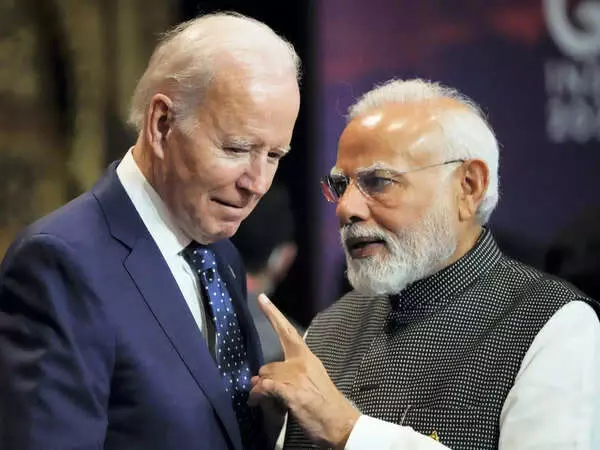Unnerving consequences
Indian Prime Minister’s successful visit to the United States is having an unsettling effect on Pakistan which is gradually losing touch with the US

Pakistan, which is reeling under multiple domestic and external problems, including a fledgling economy, successive terror strikes, separatist trends, and political fragility, is trying to come to terms with the recently concluded successful visit of the Indian Prime Minister to the United States. It should be reiterated that this US visit received maximum publicity worldwide, and Prime Minister Modi was accorded an unprecedented reception on US soil, including the rare honour of addressing a joint session of the US Congress.
Moreover, the visit was marked by a series of significant pacts on technical and defence operations, which are expected to greatly contribute to Indo-US bilateral relations. The visit was also significant due to the absence of any mention of Kashmir during the summit between Indian Prime Minister Modi and US President Joe Biden, which may have possibly hit Pakistan. This aspect is certainly a sore point for Pakistanis, as they have not witnessed such an occurrence in the past chapters of history between the US and Pakistan. Several newspapers and editorials have published in-depth articles in various columns of the print media, generating immense academic interest among a cross-section of Pakistanis within and outside the country.
Imtiaz Gul, Head of the Independent Centre for Research and Security Studies in Islamabad, has recently expressed his reaction to Modi's visit, stating that Pakistanis agonize over three simultaneous crises — political, constitutional, and economic — while neighbouring India forges ahead to establish new partnerships and reinforce existing ones in a world driven by bloc politics and geo-economic interests. He adds that the trajectory of Indo-US relations, particularly since 2006, is the envy of many countries. Besides the strategic convergence, their cooperation in trade, science, technology, defence, and Artificial Intelligence (AI) is growing exponentially. However, this is not a completely congruent partnership, driven only by the US desire to build up Indian power as a means of creating a geopolitical equilibrium in Asia vis-a-vis China. Multiple factors, primarily a nationalistic ethos and awareness of its own weight and size, prevent India from acting as a US 'yes man' in Asia. India will never sacrifice its independence, despite its strong desire to grow with Washington's support through multiple partnerships.
These views of Imtiaz Gul are shared by most academics who criticize Pakistan's foreign policy and praise India for its successful outreach to the US — once an all-weather political and military ally of Pakistan. Furthermore, during a podcast with the Council on Foreign Relations on May 16, Ashley J Tellis, a senior fellow at the Carnegie Endowment for International Peace, made compelling points while highlighting several noteworthy aspects of the growing Indo-US relationship, including a combination of mutual interests, opportunities, and limitations. Tellis assesses that India's unique interests would always prevent it from blindly following the US.
In Pakistan, it is also recognized that the Indian leadership appreciates the US as the most eminent military and economic power, and India stands to gain a lot in terms of defence deals and technologies. Bilateral agreements between India and the US have already strengthened Indian military capabilities, allowing the use of each other's military logistics (LEMOA), compatibility of encrypted communication equipment (COMCASA), and the exchange of geospatial intelligence (BECA). During the recent visit of the Indian Prime Minister to Washington, the US also agreed to sell armed drones and manufacture GE engines in India.
Meanwhile, this further confirms India's growing proximity to the US. In another response, retired Foreign Secretary Aizaz Ahmad Chaudhry commented on the Indian Prime Minister's visit to the US, stating that India is not yet prepared to sacrifice its long-time ties with Russia. India did not condemn Russia for its aggression against Ukraine and has also started purchasing Russian oil, which, according to Aizaz Ahmad Chaudhry, helped Russia counter the deleterious impact of Western sanctions. Similarly, India aims to engage with China on its own terms and not on behalf of the US, despite the serious border issues between India and China. India has also maintained its trade and economic relations with China and cooperates closely with China on forums such as BRICS, SCO, AIIB, and others. This too is a compliment to India from a retired Pakistani diplomat.
In the meantime, a segment of the Pakistani diplomatic fraternity also asserts that there are two primary foundations for the close partnership that India and the US seek to establish: geopolitical interests in the Indo-Pacific region and shared democratic values. However, there are issues that impose limitations on what can be achieved in both of these aspects. While shared geopolitical objectives mainly revolve around China, India is not inclined to be classified as a 'US ally.'
Furthermore, a section of the Pakistani intelligentsia interprets that the joint statement after Modi's visit does not explicitly mention China or Russia but allegedly makes a negative reference to Pakistan in the context of cross-border terrorism, even though Pakistan claims to have "fought against terrorism." This claim does not hold water.
Either way, the triumphant visit of the Indian Prime Minister to the US seems to have rattled Pakistani policymakers who, after addressing their internal insurmountable problems, must expeditiously recalibrate their foreign policy with fresh thinking on India, as India appears to have gained an advantage over Pakistan in eliciting a highly positive response from the US, thereby reinforcing their bilateral ties and dictating terms from a position of strength.
The writer is an IPS officer, Adviser NatStrat, security analyst and a former National Security Advisor in Mauritius. Views expressed are personal



